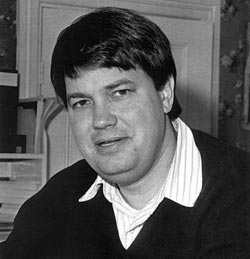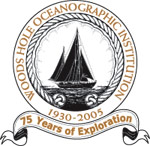This is an archived site. This site is no longer being maintained or reviewed for broken links.
Employee Portrait Gallery—Jim Broadus
 |
|
|
Jim Broadus in his second-floor office in Crowell House, circa 1992. The house was built in 1871 by Azariah Foster Crowell, who came to Woods Hole in 1867 as a chemist for the Pacific Guano Company's factory on Penzance Point. Jim was quite fond and proud of the decorations and murals in Crowell House that the Institution has preserved, and his office was outfitted with a selection of his own well-worn antiques. |
|
Economist Jim Broadus was the fourth director of WHOI’s marine policy program and the first social scientist appointed to the Institution’s scientific staff. Director Paul Fye founded the program in 1971 to promote “wise use of the ocean “and served as its director for the first eight years. Broadus followed Bob Morse (1979-80), who had been dean of the Joint Program, and geologist Dave Ross (1980-85).
With an undergraduate degree from Oberlin College and a Ph.D. from Yale University in economics, Jim had been at the University of Kentucky teaching the economics of energy production and distribution when he decided to turn his attention to marine economics and came to WHOI as a Marine Policy and Ocean Management Fellow in 1981. He was appointed to the scientific staff in 1984 and named Marine Policy Center (MPC) director in 1986. He held that position until he died unexpectedly in 1994 at age 47 while attending an international conference on marine instrumentation in Hawaii.
Colleagues characterize Jim as a scholar with an incisive approach to problem solving, dedication to the highest standards of scientific investigation, and a knack for discerning—typically ahead of the marine policy mainstream—the field’s next major issues. Jim established close working relationships between MPC and ocean policy centers in England, Russia, Japan, Korea, and China, and he organized numerous projects with marine policy colleagues in Ecuador, Colombia, Jordan, Norway, and many other countries. Jim reoriented the center's emphases from anthropology and political science to economics and international law, and under his leadership MPC emerged as a world leader among independent ocean policy research centers. Jim also gained international renown for his own work on the economics of marine minerals and seabed mining, and later on the economics of climate change.
Jim hired several current members of the marine policy group who remember him for wise counsel, personal warmth, rapier wit, and Southern cordiality.
[back]

